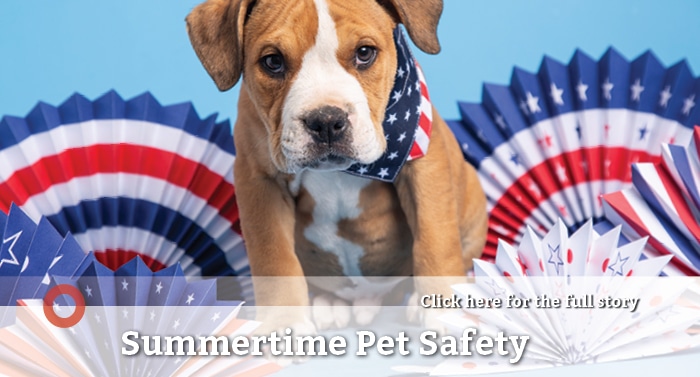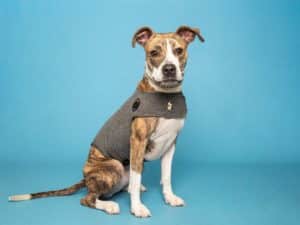How to protect your pets from fireworks, monsoon storms and the heat
By Bretta Nelson
*Photos courtesy of Arizona Humane Society
It is a holiday that many pet parents often dread – Fourth of July. The loud booms, startling flashes and unexpected whizzing can send pets into a frenzy. Often, it isn’t just the Fourth of July that is affected as festivities start well in advance of the holiday which can cause further stress for our pets.
Sadly, more pets go missing around and on Independence Day than any other holiday and the fallout is on full display each year at animal shelters across the country. However, the Arizona Humane Society (AHS) has some tips and tricks to help keep pets safe, not only for the holiday but throughout monsoon season.
Proper Identification
Ensure that your pets have current ID tags and updated microchips. This will greatly increase the chances that a lost pet will be reunited with their owner. Collars and ID tags can often come off when a pet gets lost, but a microchip is permanent identification which gives pets the best chance of coming back home. A microchip is the size of a grain of rice and easily inserts under a pet’s skin, typically between their shoulder blades. One of the first things that veterinary clinics and animal shelters will do when a stray pet comes in is to scan them for a microchip that will lead them to their pet parent’s contact information.
Keep Pets Indoors and Distracted
Fireworks and bursts of bright flashing lights can frighten pets and trigger them to flee or escape the yard. This can be disastrous on busy streets, especially in the extreme summer heat. Keep pets away from firework displays and avoid taking pets to firework shows. Instead, for pets with severe anxiety, keep them in an escape-proof room and turn on the radio or TV to distract them. Provide their favorite bedding, toys, treats and plenty of water.
Know Pet’s Whereabouts
Do not leave pets unattended in the backyard as the sound of fireworks can send them over the fence or digging to get out. Additionally, unattended food attracts curious pets onto counter tops or into trash cans. Alcohol and many foods found on your dinner plate can be dangerous to our pets.
Keep Cool
The Fourth of July occurs during one of Arizona’s hottest months, and panicked pets are subjected to heat stroke. Signs of heat stoke include excessive panting, increased heart rate, disorientation, bright red gums, vomiting, diarrhea, seizures and collapsing. Be sure pets have plenty of shade and fresh water, while also keeping them off the hot pavement. A dog’s paw pads can easily burn on the
pavement so be sure to avoid the hottest times of day and also invest in dog booties for any veterinary visits that are needed during the summer months.
Pet owners may think they are in the clear after the Independence Day holiday, but many of these tips also come in handy for Arizona’s monsoon season which takes place now through September 30. Because pets can have an increased sensitivity to storms it can result in them having an exaggerated fear of storms, or storm phobias, potentially causing them to run away.
Storm Phobias in Dogs
Storm phobia in our dogs may be caused by a change in barometric pressure or an increase in static electricity in the air. A pet may be fearful of visual cues such as lightning or blowing leaves and dirt. Auditory cues such as rain and thunder may create anxiety for a pet, as well. Storm phobia is one of the most common phobias in dogs and may present as general anxiety, whining and barking, house soiling or destructive behavior.
If your pet has a storm phobia, it is critical that you do not punish them for showing fearful or anxious behavior. Instead, pet owners can create positive associations with storms by giving treats, toys, and verbal praise for appropriate behaviors during a storm. Obedience classes and daily interactions with the trigger can also help reduce phobias and anxiety in pets who are more sensitive to storms.
Desensitization & Counter-Conditioning
One way to desensitize pets to storms or fireworks is to play a CD or music track that has thunderstorms or fireworks in the background. However, it is critical that you do so gradually, during times when you can control the trigger. This can be done in three steps:
- Begin by playing a recording with the sound that your pet fears at a very, very low level where they show no fear.
- When doing so, feed your pet high value treats like hotdogs or chicken while the recording is playing, stop feeding the treats as soon as the recording is over.
- Gradually increase the volume of recording over several sessions – if your pet shows fear or anxiety during training, stop immediately and start the next session at a lower volume. Never push your pet and be sure to go at their pace.
Additionally, specialized items such as a ThunderShirt or dog appeasing pheromones can also be used to give pets a greater sense of security. ThunderShirts function as a swaddle, or calming wrap, for cats or dogs and the pressure helps them feel calmer and less anxious. It is recommended that you introduce your pet to a ThunderShirt prior to a storm or fireworks taking place so that they can get used to it prior to being triggered. For pets with severe anxiety, AHS also recommends consulting with your veterinarian or a veterinary behaviorist, as needed.
Help is On the Way
If your pet goes missing this summer or you find a lost pet, visit azhumane.org/lostpet for tips to help get them back home.
To report signs of homeless animals in distress this summer, please call AHS’ Emergency Animal Medical Technicians™ at 602.997.7585 ext. 2073. For more information on lost or found pets, visit azhumane.org/lost-a-pet.
Ways to Keep Pets Cool this Summer
- Play in sprinklers or kiddie pool
- Keep pets indoors when possible
- Never, ever leave a pet in a hot vehicle
- Avoid long walks, hikes, excessive play
- Never chain or tether a pet outdoors
- Consider dog booties for hot pavement
- Provide pets with extra cool water sources
- Limit exercise to early mornings or late evenings
Bretta Nelson is a graduate of the University of Wisconsin and has served as the Public Relations Manager for the Arizona Humane Society for the past 11 years and currently serves on the nonprofit organizations Emergency Response Team which deploys to disasters throughout the state. Bretta and her fiancé, Trey, share their home with their beloved rescue dogs, Zoe, a seven-year-old Black Lab/German Shepherd mix and Indie Rose, a three-year-old Lab/Pit Bull/Cattle Dog mix.







